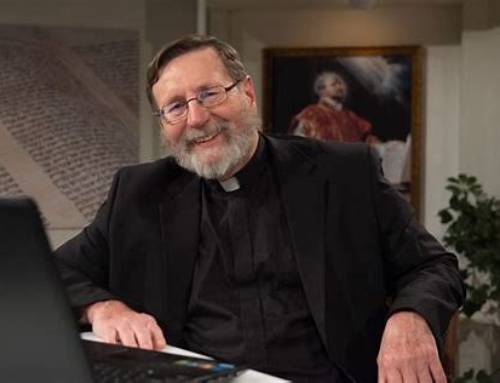The gospel reading appointed for today should be of vital interest for both the church and the world.
It is Jesus’ teaching on marriage. Here it is. Take time to read it.
Some Pharisees approached Jesus, and tested him, saying,
“Is it lawful for a man to divorce his wife for any cause whatever?”
He said in reply, “Have you not read that from the beginning
the Creator made them male and female and said,
For this reason a man shall leave his father and mother
and be joined to his wife, and the two shall become one flesh?
So they are no longer two, but one flesh.
Therefore, what God has joined together, man must not separate.”
They said to him, “Then why did Moses command
that the man give the woman a bill of divorce and dismiss her?”
He said to them, “Because of the hardness of your hearts
Moses allowed you to divorce your wives,
but from the beginning it was not so.
I say to you, whoever divorces his wife
(unless the marriage is unlawful)
and marries another commits adultery.”
His disciples said to him,
“If that is the case of a man with his wife,
it is better not to marry.”
He answered, “Not all can accept this word,
but only those to whom that is granted.
Some are incapable of marriage because they were born so;
some, because they were made so by others;
some, because they have renounced marriage
for the sake of the Kingdom of heaven.
Whoever can accept this ought to accept it.”
The first thing to observe is that Jesus is uncompromising. Marriage is the union of one man and one woman for life. The reason he is uncompromising is that this is rooted in the natural order. This is the order from the beginning. This is how we are made. The other reason he is uncompromising is that this was established by God himself.
Where this translation says “That which God has joined together man must not separate.”…some translations read “That which God has joined together man may not separate.” In other words, divorce is not only un-natural. It is impossible.
Wow! No wonder the disciples found this to be a hard saying.
There is a deeper reason, however, for Our Lord’s uncompromising stance. This is because marriage is not only part of the created order, it is part of what it means to be created as a human being. Man without woman is incomplete and woman without man is incomplete. St Paul affirms this in I Corinthians 11.
For man did not come from woman, but woman from man; neither was man created for woman, but woman for man …Nevertheless, in the Lord woman is not independent of man, nor is man independent of woman. For as woman came from man, so also man is born of woman. But everything comes from God.
That complementarity and mutual fulfillment is completed within marriage. The marriage act itself is a biological sign of the deeper complementarity of male and female, animus and anima, all that is feminine and all that is masculine. Marriage therefore not only completes the man as a man and the woman as a woman, but both are therefore completed and fulfilled as human beings.
Through the procreation of children they also complete their humanity because the man becomes fully a man as he becomes a father and the woman becomes fully a woman as she becomes a mother. To explain this proposal more clearly we should stop for a moment and ask what defines a man and what defines a woman.
I will very often ask couples planning to be married this question, “What is a man?” or “What is a woman?”
They think for a few moments and then answer something like “Male chromosomes and male genitalia” and “female chromosomes and female genitalia and breasts”
“Yes. That is correct, and what are those organs for?”
“For the reproduction and nurturing of children.”
Therefore a man is a father or a potential father. A woman is a mother or a potential mother.
Marriage and producing a family therefore fulfills our human destiny, and so we remember the very first commandment: “Be fruitful and multiply.”
I say all that to say this: Divorce wrecks all that, and as it wrecks all that it wrecks what it means to be a human being.
How does it happen? We are seeing it all around us. It is a commonplace to blame the sexual revolution for the confused, bewildered and wild state of human sexuality in our society. This is true, and artificial contraception and the subsequent acceptance of sex as nothing more than playtime have all played a part.
What is often overlooked however, is the terrible cost of divorce as part of this same sexual revolution. Promiscuity and porn and prostitution and all the other sexual transgressions have undermined healthy human sexuality, but divorce was a bomb placed beneath the one institution and sacrament that could bring order out of the chaos, discipline out of the promiscuity, loyalty out of the treachery and creativity out of the sterility.
Marriage was the rock that could redeem these instinctual urges. Marriage was the sacrament that could sanctify what was drifting into sordid self destruction.
Widespread divorce, therefore ripped marriage apart, and as it ripped marriage apart it ripped apart humanity’s possibility for sexual sanity.
Why are we now rocked with feminism, homosexualism, promiscuity, transgender confusion and every possible confusion, bewilderment, fear and perversion?
Because marriage was broken.
The final disaster goes back to my main point–that through marriage humanity has the possibility of growing up and being fulfilled as men and women and therefore as human beings.
The destruction of marriage undermines and explodes that possibility. Without marriage we are alone.
There is, however, a redeeming feature in that alone-ness–and beautifully, the gospel for today does not end in the defense of marriage only.
Jesus goes on to extol the possibility of celibacy. “It is better not to marry!” the disciples exclaim. Jesus acknowledges this possibility–that one can also find true human fulfillment within celibacy: “those who renounce marriage for the sake of the kingdom.”
This great mercy offers a way of grace not only for those who are celibate by choice, but also those who have never had the opportunity of marriage and also those who are divorced, widowed or abandoned.
While marriage completes the man or woman it is possible for that fulfillment and completion to take place for the single person through their attachment and devotion to the Kingdom of God.
Finally, an observation about being a married priest: people have often asked how I can fulfill two vocations–to marriage and the priesthood. I wish to write further about this at some length when I get the chance, but I have found as I mature in both my marriage and my priestly vows that there is a deep mystery going on that I find difficult to define and articulate.
All I can say is that as I get older it seems that I experience within marriage my true marriage to Christ alone. If the celibate is married to Jesus it seems as if I am at least attempting that total commitment through the total commitment to my marriage. I realize this is paradoxical, but if I am correct in my feelings, then what the married priest may contribute to the church is more than simply being a spare pair of hands somewhat begrudgingly admitted to a celibate caste of priests.
Perhaps admitting married men to the priesthood can teach us something profound about both celibacy and marriage and how the two complement one another and help both single people and married people to move more fully and completely into that transformation into the image of Christ which is the destiny of all the baptized.






Fr. D, I wish that more of the people who talk about priests marrying would come looking for you and talk to you. You’ve said that’s not happening. I’m praying that it will. Finding your total commitment to Christ within your total commitment to your marriage makes profound sense to me. We still think in too binary a fashion: either this or that, but not both/and. Please keep writing about this subject.
In Holy Orthodoxy our priests are for the most part married, and all of our bishops are chosen from among the monastics. There are exceptions such as one priest I know who became a heiromonk after his wife passed. Our priests are not allowed to remarry after the death of their spouse, should they outlive them. This was the manner of the entire church prior to medieval times.